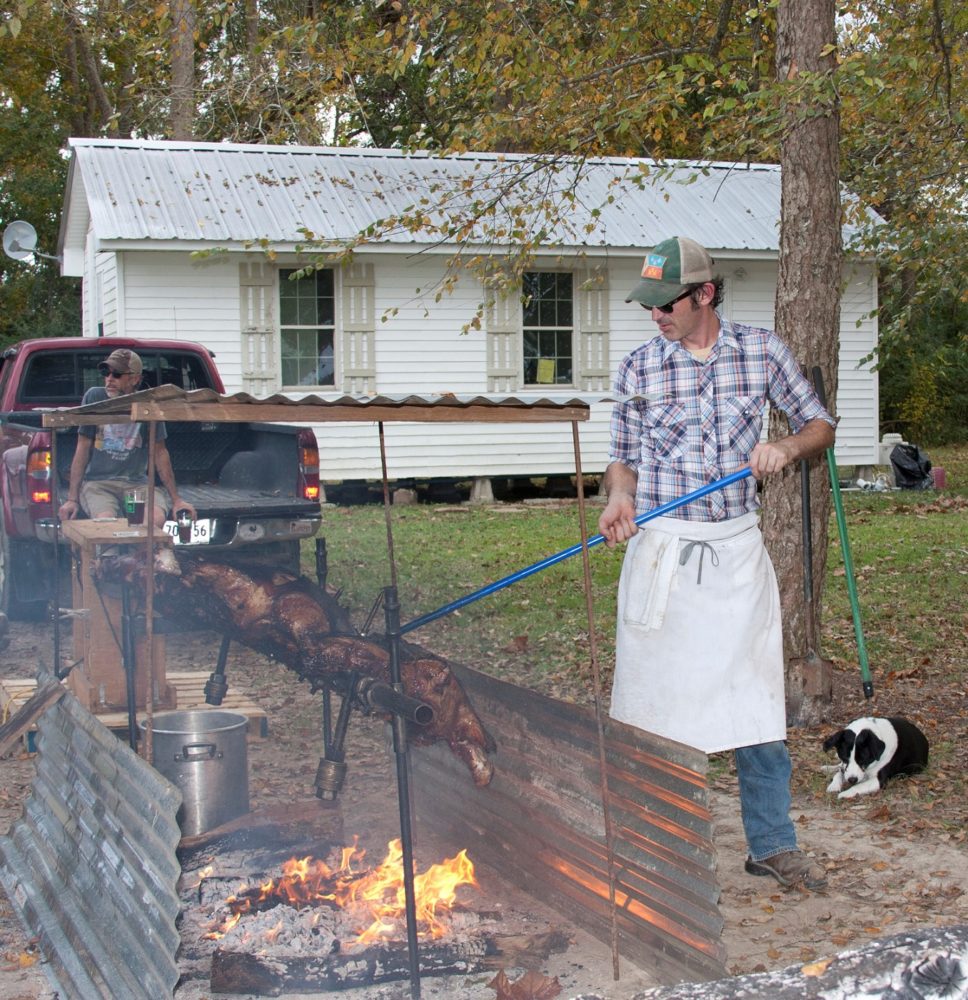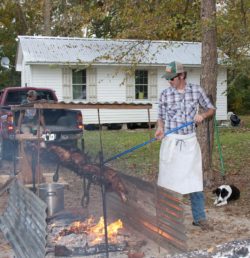Magazine
Hog Wild
A secret festival is the highlight of the Madison Parish social calendar—for those in the know
Published: August 30, 2019
Last Updated: March 22, 2023

Photo by Lucius Fontenot
Pig roasts across Louisiana are beloved community and family affairs. Here, Toby Rodriguez uses a mop to baste a roasted pig for a private dinner at Bayou Teche Brewing in Arnaudville.
This annual event, started in 1993, is a private, invitation-only party hosted by ‘Big’ Mike and Debbie Foster on their family farm deep in the heart of the Louisiana Delta. The festival celebrates culture through food and music. Locally raised pigs are roasted and served alongside potluck dishes brought by attendees, and the party hosts regional acts such as Doug Duffey, from Monroe, as well as national acts such as The Gold Magnolias, a New York–based group whose sound is very much rooted in delta blues and funk. Mike and Debbie’s son, Mike Jr., takes on much of the event planning and never misses a fest, even though he lives in Brazil.
I got off the interstate and meandered alongside rows of cotton, soybeans, and corn, beginning to doubt my GPS. What music festival could possibly be out here? But glancing at the postcard that served as my invitation, I pressed on and, sure enough, a cardboard cutout of a pig greeted me, holding a sign indicating where to park.
The party was already in full swing. As I walked up the long road to the big house, a golf cart pulled up beside me, the driver hollering for me to get in. I must’ve looked new, because as I climbed onboard, the other passengers glanced at me with smiles and asked, “First time?”
To say I wasn’t prepared for the scene before me is an understatement. I thought maybe there’d be some lawn chairs, musicians playing in a circle, a bonfire with a few tents scattered around. I stood in awe at the rows of neatly organized hay bales that served as seating and the stage situated directly in front of the house.
I felt unstuck in time. This was 2018 in the Louisiana Delta, but I was in a psychedelic dream of the ’60s.
Strings of colored lights connected the trees around me and colorful flags flew over my head. I quickly set up my tent and made my way to a hay bale just in time to see Doug Duffey and the Louisiana Soul Revival take the stage. The man seated in front of me turned around, exclaiming, “Hey, I know you! Lesli, right?” I nodded and he, just like the others on the golf cart, said, “First time, huh?” He pulled a beer from his cooler, handed it to me, and then proceeded to introduce me to his wife, best friends, and anyone else within earshot.
Suddenly, I felt home and—even though I’d come alone—in the company of great friends.
It’s difficult to mark where that night ended and the next day began, as the party broke out into smaller groups of people huddled around fire pits enjoying various impromptu jam sessions.
Seated bya fire, I thought about the history of this patch of land. Talla Bena is adjacent to Milliken’s Bend, the majority of which is presently underwater, due to the changing course of the Mississippi River. In 1863, the once–lively town was the site of a catastrophic Civil War battle. Because of its proximity to Vicksburg, the battle at Milliken’s Bend aided Grant in his siege of Vicksburg and ultimately helped the Union win the war.
The next morning, I wandered around the expansive walking trails that surround the Fosters’ home, trying to imagine how this remote place—now home to a celebration of music, culture, family, and food—was once the site of hatred manifested through racial and political division and violence.
“We settled in on the front lawn and, as strangers, we were welcomed with hugs our first year. And now, after almost twenty years, we’re treated like family.”
There is no division at Pigfest. The surrounding community all donates something to keep the festival going, a strategy that has sustained it for twenty-five years. The police volunteer help with parking and security. Area musicians donate their talents, and everyone breaks out their favorite family recipes. Every aspect of the festival—even the vibrant banners of tiny flags, the twinkling lights that adorn the trees, and the raised platform stage, affectionately known as the “little big stage”—is made possible through volunteers. A tree sitting in front of the home—aptly termed “the fruit tree”—bears rows of bananas and baskets of assorted fruit brought by volunteers. Everyone brings a dish, and most attendees take turns greeting people and serving in the assembly-style food line, which is just one more way the sense of community at this festival grows.
Although the region is rural now, no longer teeming with people like it did in the mid- to late 1800s, much of the community’s vibrancy is preserved through Pigfest. Most travelers are likely to pass through Madison Parish quickly, taking notice of little, aside from the pastoral fields. But it’s those very fields that help sustain Pigfest, and this connection between people and land—between people and their neighbors—is as alive at Pigfest as it ever was in the 1800s. Pigfest is a private event precisely because that is the key to preserving its culture, to preventing its commercialization, to enabling the festival to maintain its own unique flavor. And if you’re lucky enough to snag an invite, you’ll become lost in so much more than music and food—you’ll grow enamored with the history of the land and its inhabitants.
Despite its exclusivity to the outside world, the local community is wholly represented. Toby Traylor, musician and proprietor of the restaurant Lea’s Lunchroom in Monroe, reflects on his history with Pigfest, which began in 1999: “I was under the impression that it was just a party in the woods, which it actually was in those beginning years. There weren’t many tents set up that year. We settled in on the front lawn and, as strangers, we were welcomed with hugs our first year. And now, after almost twenty years, we’re treated like family.”
That’s the thing about Pigfest—you come alone, as a stranger to everyone except the person who invited you, but you leave as a beloved member of an extended family who has shared two days of food and music. And, if you’re anything like me, you leave knowing to bring more than King’s Hawaiian rolls next time.
Lesli Rambin is a north Louisiana native who earned her master’s in creative writing from the University of Louisiana at Lafayette. Prior to relocating to New Orleans and joining the staff at the Louisiana Endowment for the Humanities, she taught English at the University of Louisiana at Monroe.
